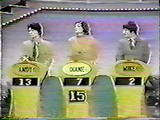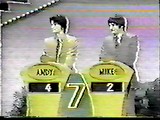

Front Game Rules
|
 The catch? In order to receive credit for a payoff point, you had to hit it exactly; you couldn't go over, and you weren't allowed to answer a question whose value would put you over. This is where strategy came in; you could block your opponents by picking questions of higher values than they could answer. Sometimes, players could even block both opponents at once and have the question all to themselves. The first to reach a payoff point won a small amount of money (usually from $25-$100, but sometimes $500), and a new payoff was set. After two rounds of play (culminating in a 90 second speed segment) the two top scorers advanced to the Final Showdown. The catch? In order to receive credit for a payoff point, you had to hit it exactly; you couldn't go over, and you weren't allowed to answer a question whose value would put you over. This is where strategy came in; you could block your opponents by picking questions of higher values than they could answer. Sometimes, players could even block both opponents at once and have the question all to themselves. The first to reach a payoff point won a small amount of money (usually from $25-$100, but sometimes $500), and a new payoff was set. After two rounds of play (culminating in a 90 second speed segment) the two top scorers advanced to the Final Showdown.
|
 In the Final Showdown, one payoff point of 7 was established, and questions ranged from 1-3 points. The same blocking rules applied. The higher-scoring player in the first round got to pick first from the categories offered. The first player to reach 7 points - without going over, of course - won the game, $250, and advanced to the bonus round to "roll the dice". In the Final Showdown, one payoff point of 7 was established, and questions ranged from 1-3 points. The same blocking rules applied. The higher-scoring player in the first round got to pick first from the categories offered. The first player to reach 7 points - without going over, of course - won the game, $250, and advanced to the bonus round to "roll the dice".
|
End Game
|
 In the second part of the round, the champ had 30 seconds to roll as many sets of dice as possible. If at any point "ShowDown" came up, the champ won $5,000. Along the way, any time the point number was rolled, it won $250 and gave the player another 5 seconds of time to roll more dice after the initial 30 had expired. In the bonus time, the point number was out of play; only "ShowDown" would be worth money. If "ShowDown" was rolled, all money accumulated from point rolls were still added. If "ShowDown" wasn't rolled, the champ returned the next day. In the second part of the round, the champ had 30 seconds to roll as many sets of dice as possible. If at any point "ShowDown" came up, the champ won $5,000. Along the way, any time the point number was rolled, it won $250 and gave the player another 5 seconds of time to roll more dice after the initial 30 had expired. In the bonus time, the point number was out of play; only "ShowDown" would be worth money. If "ShowDown" was rolled, all money accumulated from point rolls were still added. If "ShowDown" wasn't rolled, the champ returned the next day.
|
Notes
|
This is a show I'd love to see revived. It had everything going for it - challenging but not overly difficult questions, an impeccable element of strategy, a charming and very comfortable host, and catchy theme music. The only problem? That endgame is far too reliant on luck. The odds are 35:1 that a player would roll "ShowDown" on the first try, and that really kills the suspense. Perhaps a growing jackpot would have made the endgame a little more intriguing to watch. The cash awards for the payoff points seemed a bit low-end, too. If I brought this show back, I'd make them $100-$1000 each, with possibly a bonus prize for hitting three payoffs in a row. Still, this has got to be among the greatest of the short-lived programs out there.